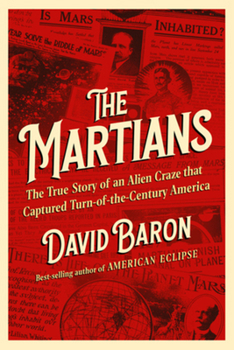The Martians: The True Story of an Alien Craze That Captured Turn-Of-The-Century America
This New York Times headline was no joke.
In the early 1900s, many Americans actually believed we had discovered intelligent life on Mars, as best-selling science writer David Baron chronicles in The Martians, his truly bizarre tale of a nation swept up in Mars mania.
At the center of Baron's historical drama is Percival Lowell, the Boston Brahmin and Harvard scion, who observed "canals" etched into the surface of Mars. Lowell devised a grand theory that the red planet was home to a utopian society that had built gargantuan ditches to funnel precious meltwater from the polar icecaps to desert farms and oasis cities. The public fell in love with the ambitious amateur astronomer who shared his findings in speeches and wildly popular books.
While at first people treated the Martians whimsically--Martians headlining Broadway shows, biologists speculating whether they were winged or gilled--the discussion quickly became serious. Inventor Nikola Tesla announced he had received radio signals from Mars; Alexander Graham Bell agreed there was "no escape from the conviction" that intelligent beings inhabited the planet. Martian excitement reached its zenith when Lowell financed an expedition to photograph Mars from Chile's Atacama Desert, resulting in what newspapers hailed as proof of the Martian canals' existence.
Triumph quickly yielded to tragedy. Those wild claims and highly speculative photographs emboldened Lowell's critics, whose withering attacks gathered steam and eventually wrecked the man and his theory--but not the fervor he had started. Although Lowell would die discredited and delusional in 1916, the Mars frenzy spurred a nascent literary genre called science fiction, and the world's sense of its place in the universe would never be the same.
Today, the red planet maintains its grip on the public's imagination. Many see Mars as civilization's destiny--the first step toward our becoming an interplanetary species--but, as David Baron demonstrates, this tendency to project our hopes onto the world next door is hardly new. The Martians is a scintillating and necessary reminder that while we look to Mars for answers, what we often find are mirrors of ourselves.
In the early 1900s, many Americans actually believed we had discovered intelligent life on Mars, as best-selling science writer David Baron chronicles in The Martians, his truly bizarre tale of a nation swept up in Mars mania.
At the center of Baron's historical drama is Percival Lowell, the Boston Brahmin and Harvard scion, who observed "canals" etched into the surface of Mars. Lowell devised a grand theory that the red planet was home to a utopian society that had built gargantuan ditches to funnel precious meltwater from the polar icecaps to desert farms and oasis cities. The public fell in love with the ambitious amateur astronomer who shared his findings in speeches and wildly popular books.
While at first people treated the Martians whimsically--Martians headlining Broadway shows, biologists speculating whether they were winged or gilled--the discussion quickly became serious. Inventor Nikola Tesla announced he had received radio signals from Mars; Alexander Graham Bell agreed there was "no escape from the conviction" that intelligent beings inhabited the planet. Martian excitement reached its zenith when Lowell financed an expedition to photograph Mars from Chile's Atacama Desert, resulting in what newspapers hailed as proof of the Martian canals' existence.
Triumph quickly yielded to tragedy. Those wild claims and highly speculative photographs emboldened Lowell's critics, whose withering attacks gathered steam and eventually wrecked the man and his theory--but not the fervor he had started. Although Lowell would die discredited and delusional in 1916, the Mars frenzy spurred a nascent literary genre called science fiction, and the world's sense of its place in the universe would never be the same.
Today, the red planet maintains its grip on the public's imagination. Many see Mars as civilization's destiny--the first step toward our becoming an interplanetary species--but, as David Baron demonstrates, this tendency to project our hopes onto the world next door is hardly new. The Martians is a scintillating and necessary reminder that while we look to Mars for answers, what we often find are mirrors of ourselves.
Format:Hardcover
Language:English
ISBN:1324090669
ISBN13:9781324090663
Release Date:August 2025
Publisher:Liveright Publishing Corporation
Length:336 Pages
Customer Reviews
0 rating





